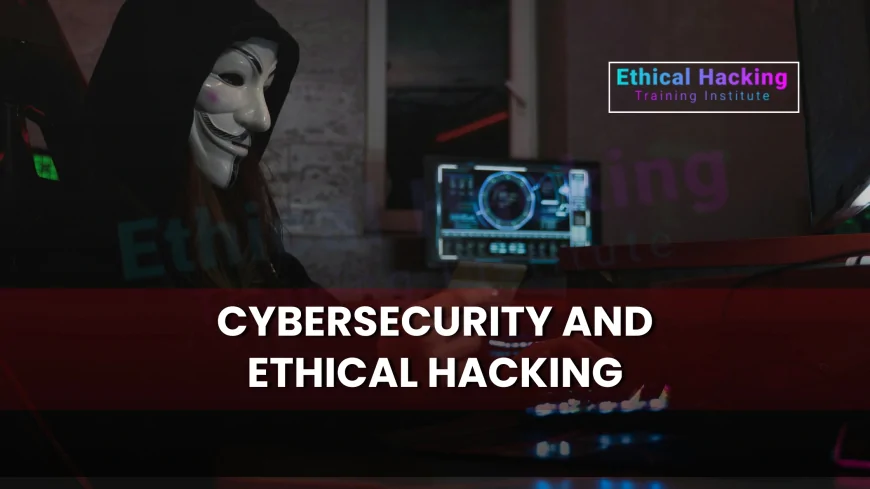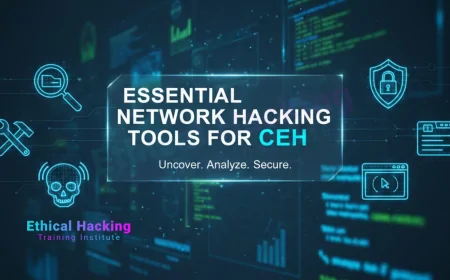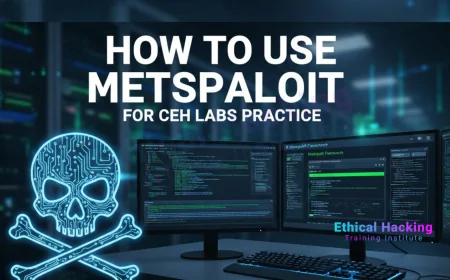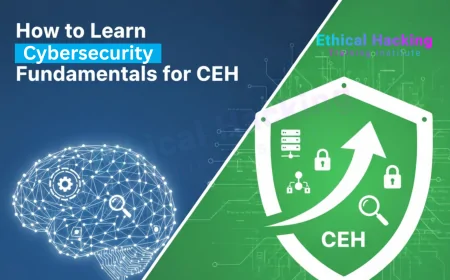Cyber Security and Ethical Hacking: The Essential Skills You’ll Need | Cybersecurity Fundamentals: Skills Every Ethical Hacker Needs
Discover the essential skills you need to succeed in cyber security and ethical hacking in 2025. Learn about key tools, certifications, technical and soft skills, job roles, and learning paths for beginners and professionals.

Table of Contents
- Introduction
- What is Cyber Security and Ethical Hacking?
- Why Skills Matter in 2025
- Top Technical Skills for Cyber Security
- Essential Ethical Hacking Skills
- Tools You Need to Master
- Soft Skills in Cyber Security
- Top Certifications to Pursue
- Real-World Application of Skills
- Job Roles You Can Target
- Learning Path for Beginners
- Learning Path for Professionals
- How to Practice Ethical Hacking
- Importance of Continuous Learning
- Future Skills in Cyber Security
- FAQs
- Conclusion
Introduction
Cyber threats are evolving fast, pushing companies to hire knowledgeable ethical hackers and cybersecurity professionals to stay protected.. In 2025, mastering essential cyber security and ethical hacking skills is not just valuable—it's critical. Whether you're aiming to protect infrastructure, test for vulnerabilities, or defend enterprise networks, having the right set of skills is the foundation for a strong and sustainable career.
What is Cyber Security and Ethical Hacking?
Cyber security refers to the practice of defending computers, networks, systems, and data from malicious attacks. It’s a cybersecurity strategy where professionals use hacker tactics ethically to secure networks and applications.
Both domains are interconnected—ethical hackers identify risks, while cyber security professionals work to eliminate them.
Why Skills Matter in 2025
Cybersecurity in 2025 is marked by fast-paced innovation, as both threats and solutions evolve in real time. With the explosive growth of AI-driven cyber threats, highly targeted ransomware attacks, cloud infrastructure vulnerabilities, and advanced persistent threats (APTs), theoretical knowledge alone is no longer enough. Employers now prioritize practical, demonstrable skills over degrees or outdated credentials.
-
The following reasons explain the urgent need for cybersecurity and ethical hacking talent in 2025.
1. Surge in Sophisticated Cyber Attacks
Attackers now use AI, machine learning, and automation to discover and exploit vulnerabilities faster than traditional defenses can keep up. Skilled professionals are needed to think like attackers, predict behavior, and apply proactive defense strategies.
2. Shift Toward Cloud and Hybrid Environments
As organizations transition to cloud-first infrastructures (AWS, Azure, Google Cloud), the complexity of securing multi-cloud environments increases. In 2025, security professionals must be well-versed in IAM, cloud configurations, and container protection to mitigate modern threats.
3. Skill-Based Hiring Models Dominate
Global tech companies are adopting skill-based recruitment, prioritizing what you can do over what you’ve studied. Certifications with hands-on labs (like OSCP, CEH, and TryHackMe paths) and project-based portfolios carry more weight than traditional degrees.
4. Cybersecurity Talent Shortage
According to ISC², there will be over 3.5 million unfilled cybersecurity jobs globally by 2025. This gap presents a huge opportunity for skilled professionals to enter the field and grow rapidly.
5. Cyber Defense is Now a Business Priority
Boards and CEOs recognize cyber risks as a business threat, not just an IT problem. Organizations are investing more in cybersecurity teams, requiring professionals who can secure endpoints, analyze incidents, and build resilient systems.
6. Bug Bounty and Freelancing Are Mainstream
Freelance ethical hacking, penetration testing, and bug bounty hunting are now viable full-time careers. Platforms like HackerOne, Bugcrowd, and Synack reward skilled hackers who can identify zero-days and security flaws that automation cannot.
7. Automation & AI Require Smarter Human Oversight
While AI tools can identify common threats, they still rely on skilled human analysts to interpret findings, understand context, and adapt defenses. Cybersecurity will always need sharp minds who can outthink machines and outmaneuver adversaries.
Top Technical Skills for Cyber Security
- Networking Fundamentals: TCP/IP, routing, DNS, firewalls
- Operating Systems: Understanding how to use SIEM systems such as Splunk or QRadar is essential for ethical hacking and cybersecurity roles, especially for incident detection and response.
- Security Information and Event Management (SIEM): Tools like Splunk, QRadar
- Threat Intelligence: Ability to track threat actors and analyze patterns
- Cryptography: Understanding of SSL/TLS, encryption, and PKI
Essential Ethical Hacking Skills
- Footprinting and Reconnaissance – Gathering target information
- Scanning Networks – Nmap, Nessus for port and vulnerability scanning
- System Hacking – Exploiting weak credentials, misconfigurations
- Web Application Hacking – Techniques include exploiting vulnerabilities like SQL Injection, Cross-Site Scripting (XSS), and Cross-Site Request Forgery (CSRF).
- Wireless Attacks – WPA2 cracking, rogue AP setups
Tools You Need to Master
- Wireshark – Packet analysis
- Metasploit – Exploitation framework
- Burp Suite – Web vulnerability scanner
- John the Ripper – Password cracking
- Aircrack-ng – Wireless attack toolset
Soft Skills in Cyber Security
Soft skills are often overlooked but highly valued:
- Critical Thinking: Analyze problems creatively
- Effective Communication: Ability to clearly document findings and convey security risks to both technical teams and non-technical executives.
- Meticulous Investigation: Carefully inspect systems and code to uncover hidden vulnerabilities or anomalies.
- Adaptability: Quickly learning new tools or threat tactics
Top Certifications to Pursue
- CEH (Certified Ethical Hacker)
- OSCP (Offensive Security Certified Professional)
- CompTIA Security+
- CISSP (Certified Information Systems Security Professional)
- CHFI (Computer Hacking Forensic Investigator)
Real-World Application of Skills
Applying your skills can include:
- Conducting penetration tests
- Setting up honeypots to study attacker behavior
- Writing and reviewing firewall rules
- Responding to real-time threats and incident reports
Job Roles You Can Target
- Security Analyst
- Penetration Tester
- Red Team Member
- Vulnerability Assessor
- Cyber Threat Intelligence Analyst
Learning Path for Beginners
- Learn basic networking and OS concepts
- Study foundational cyber security principles
- Practice on platforms like TryHackMe or Hack The Box
- Take introductory certifications like CompTIA Security+
- Start building a lab environment
Learning Path for Professionals
- Advance into OSCP, CRTP, or CISSP
- Join red or blue team engagements
- Contribute to open-source cyber security tools
- Teach, mentor, or publish research on platforms like GitHub
How to Practice Ethical Hacking
- Beginner and advanced ethical hackers can enhance their skills using platforms like Hack The Box and TryHackMe for guided labs and CTFs.
- Engage in CTFs (Capture the Flag) competitions
- Build virtual labs using VirtualBox or VMware
- Set up vulnerable systems like Metasploitable, DVWA, or VulnHub
Importance of Continuous Learning
Cyber threats evolve daily. Successful cyber professionals commit to lifelong learning through:
- Podcasts and cyber threat reports
- Online courses and certifications
- Security blogs (Krebs on Security, ThreatPost)
- Reddit communities like r/netsec and r/ethicalhacking
Future Skills in Cyber Security
Looking ahead, professionals should prepare for:
- Cloud Security: AWS, Azure, GCP protections
- AI Threat Mitigation: Identifying AI-powered attacks
- IoT Security: Securing embedded devices
- Blockchain Security: Smart contract auditing
FAQs
1. What are the essential skills for a career in cyber security?
Essential skills include knowledge of networking, operating systems (Linux and Windows), firewalls, encryption, SIEM tools, and threat analysis. Soft skills like communication and critical thinking are also vital.
2. Is ethical hacking the same as cyber security?
No, ethical hacking is a subset of cyber security. While cyber security includes defense and policy, ethical hacking focuses on offensive testing to identify vulnerabilities.
3. Can I become an ethical hacker without a degree?
Yes, many professionals become ethical hackers through certifications and hands-on experience, without a traditional college degree.
4. What are the top certifications in cyber security?
Popular certifications include CEH, OSCP, CompTIA Security+, CISSP, CHFI, and Google Cybersecurity Professional Certificate.
5. How long does it take to become job-ready in cyber security?
It typically takes 6–12 months with focused learning, hands-on labs, and at least one certification to become job-ready in an entry-level role.
6. What programming languages are useful for ethical hacking?
Python is the most recommended. Bash scripting, JavaScript, and a basic understanding of C/C++ are also helpful.
7. What tools should I learn as a beginner hacker?
Start with Nmap, Wireshark, Metasploit, Burp Suite, and basic Linux terminal commands. These are fundamental for reconnaissance and exploitation.
8. Is ethical hacking legal?
Yes, ethical hacking is legal when conducted with proper permission, such as in penetration tests or bug bounty programs.
9. What is the difference between red team and blue team?
Red teams simulate attacks to find vulnerabilities. Blue teams defend and monitor systems against threats. Both are essential to enterprise security.
10. Where can I practice cyber security skills?
Practice on platforms like TryHackMe, Hack The Box, CyberSecLabs, VulnHub, and PortSwigger Web Security Academy.
11. Are online courses enough to learn ethical hacking?
Yes, if they include hands-on labs, projects, and real-world scenarios. Look for platforms like Udemy, TCM Security, and Offensive Security.
12. What are the job opportunities after learning ethical hacking?
Roles include Penetration Tester, Security Analyst, Vulnerability Assessor, Red Team Operator, and Security Consultant.
13. Do I need to know Linux for cyber security?
Yes, Linux is a preferred operating system in cyber security environments. It’s widely used in servers, firewalls, and testing tools.
14. How much can I earn as an ethical hacker?
In India, entry-level ethical hackers earn ₹4–7 LPA. Globally, salaries range from $60,000 to $120,000 annually depending on skills and certifications.
15. Are there free resources to learn cyber security?
Yes. TryHackMe offers free rooms, YouTube channels like NetworkChuck are great, and Cybrary has free learning paths for beginners.
16. What is social engineering in hacking?
It’s the art of manipulating people into revealing confidential information, often through phishing, pretexting, or impersonation.
17. How do I stay updated in cyber security?
Follow threat reports, subscribe to security newsletters, join forums like Reddit's r/netsec, and take regular refresher courses.
18. Can I work remotely in cyber security?
Yes. Many cyber roles such as threat analysts, bug bounty hunters, and SOC analysts offer remote or hybrid work options.
19. What is a bug bounty program?
It’s a platform where ethical hackers are rewarded for finding and responsibly disclosing security vulnerabilities in apps or systems.
20. Is cyber security a good career in 2025?
Absolutely. With rising threats and a global skill shortage, cyber security offers high demand, job security, and strong salaries in 2025 and beyond.
Conclusion
Cyber security and ethical hacking are no longer niche areas—they are central to business continuity, national security, and personal privacy. To succeed in 2025 and beyond, one must develop a broad spectrum of technical and soft skills. From mastering tools to understanding attacker psychology, your journey begins with dedication and the right training. Build, practice, certify, and keep hacking—ethically.
What's Your Reaction?
 Like
0
Like
0
 Dislike
0
Dislike
0
 Love
0
Love
0
 Funny
0
Funny
0
 Angry
0
Angry
0
 Sad
0
Sad
0
 Wow
0
Wow
0


















